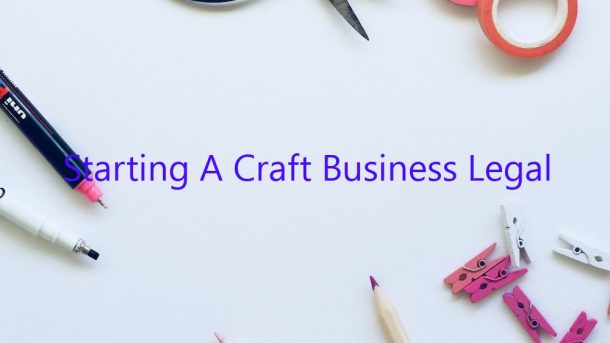Starting a craft business can be a fun and profitable venture, but it’s important to understand the legal considerations involved in setting up and running a business. Here’s a quick overview of the key legal issues you need to be aware of.
Business Structure
One of the first things you need to decide when starting a craft business is what legal structure to operate as. The most common business structures are sole proprietorship, partnership, and corporation. Each has its own set of pros and cons, so you’ll need to weigh the pros and cons of each and decide which is the best fit for your business.
Business Licenses and Permits
Depending on the type of craft business you run and the location where you operate, you may need to obtain various licenses and permits. For example, if you run a home-based business, you may need a business license from your local municipality. If you sell your crafts at craft fairs or other events, you may need a vendor’s license. And if you operate a business from a rented retail space, you’ll likely need a commercial lease and a business license from the local zoning board.
Trademarks and Copyrights
If you plan to sell your crafts online or in stores, you’ll need to protect your intellectual property by registering your trademarks and copyrights. This will help protect your brand and ensure that no one else can use your designs or trademarks without your permission.
Employment Law
If you hire employees to help run your craft business, you’ll need to comply with employment laws governing things such as minimum wage, overtime, and workers’ compensation. You’ll also need to create an Employee Handbook that outlines your employees’ rights and responsibilities, and you’ll need to comply with state and federal wage and hour laws.
Taxes
As a business owner, you’ll need to file various tax returns and pay various taxes, such as federal income tax, state income tax, and Social Security and Medicare taxes. You’ll also need to register with the IRS and your state’s tax department, and you’ll need to set up a payment schedule to make sure you’re paying your taxes on time.
This is just a basic overview of the key legal issues you need to consider when starting a craft business. For more detailed information on each of these topics, please consult an attorney or business advisor.
Contents [hide]
Is it illegal to sell handmade stuff?
Is it illegal to sell handmade stuff?
There is no easy answer to this question, as the legality of selling handmade items will depend on a variety of factors. In some cases, it may be illegal to sell handmade items if they are deemed to be in violation of copyright or trademark laws. In other cases, it may be illegal to sell handmade items if they do not meet certain safety or quality standards.
If you are unsure about the legality of selling your handmade items, it is best to consult with an attorney or other legal professional.
Do I need a tax ID to sell my crafts?
Whether or not you need a tax ID to sell your crafts depends on a few factors, including the state you live in and the type of craft you’re selling. Generally speaking, most states do not require you to have a tax ID to sell crafts, but you may need to register as a business with your state.
If you’re selling crafts online, you will likely need to collect sales tax from your customers. You may also need to pay sales tax on the materials you use to make your crafts. To learn more about sales tax and how it applies to your business, consult with an accountant or tax specialist.
If you’re selling your crafts in a brick-and-mortar store, you may be required to collect sales tax from your customers. In some states, you may also be required to have a sales tax license. To learn more about sales tax and how it applies to your business, consult with an accountant or tax specialist.
Ultimately, the best way to determine whether or not you need a tax ID to sell your crafts is to consult with your state’s department of revenue or taxation.
How can I start a small craft business from home?
Starting a small craft business from home can be a great way to make some extra money, and it can be a lot of fun too. Here are a few tips on how to get started:
1. Start by creating a business plan. This will help you to outline your goals and strategies for your business.
2. Choose a business name and register it with the state.
3. Get a business license and tax ID.
4. Set up a business bank account.
5. Choose a business structure (sole proprietorship, LLC, etc.).
6. Buy some business cards and create a website.
7. Start marketing your business.
8. Launch your business!
Is selling crafts a hobby or business?
The answer to this question is not always clear-cut. It can depend on a variety of factors, such as the amount of time and money you invest in your craft business, the number of products you sell, and the level of demand for your products.
If you are selling crafts as a hobby, you may not be concerned with making a profit, and you may only sell a few items each year. In this case, you may not consider your craft business to be a true business.
However, if you are selling crafts as a business, you may be concerned with making a profit, and you may sell numerous items each year. In this case, you may consider your craft business to be a legitimate business.
There are a number of factors to consider when determining whether or not selling crafts is a hobby or business. Ultimately, it depends on the individual circumstances of each crafter.
Do I have to pay taxes if I sell crafts?
There is no simple answer to the question of whether you have to pay taxes when you sell crafts. It depends on a variety of factors, including the type of craft you sell, the sales venue, and your tax status.
If you are a professional crafter, you are likely required to pay income tax on the money you earn from your sales. However, if you are selling crafts as a hobby, you may not need to pay any tax.
If you sell your crafts through a third-party site like Etsy, you will likely be required to pay sales tax on your transactions. However, if you sell your crafts directly to customers, you may not need to charge sales tax. Check with your state’s tax authority to be sure.
In most cases, you will not need to pay taxes on the materials you use to make your crafts. However, you may need to pay taxes on the income you earn from selling finished products. To be safe, it’s always best to check with a tax professional to find out exactly what taxes you may need to pay.
Do I have to register as a business to sell crafts?
Do you want to sell your crafts online or in person? If you do, you may need to register as a business.
Selling crafts is a great way to make some extra money, but it’s important to understand the laws and regulations that apply to your situation. In most cases, you’ll need to register as a business in order to sell your crafts.
There are a few important things to keep in mind when registering as a business. First, you’ll need to choose the right business structure. This will determine the amount of taxes you’ll owe, as well as the amount of paperwork you’ll need to file.
You’ll also need to register with your state and local government. This process can be complicated, so it’s important to consult with an attorney or accountant.
Overall, registering as a business is a great way to protect yourself and your business interests. It’s also a requirement for most online marketplaces. By understanding the process and requirements, you can ensure that your business is compliant with the law.
Do you report hobby income?
If you earn income from a hobby, you may be required to report that income on your tax return. Here’s what you need to know about hobby income and taxes.
What is Hobby Income?
Hobby income is income that you earn from a hobby. A hobby is a leisure activity that you engage in for enjoyment, recreation, or relaxation. Hobbies can include activities like playing sports, gardening, or collecting things like coins or stamps.
Do I Have to Report Hobby Income?
Whether or not you have to report hobby income depends on a few factors. First, the amount of income you earn from your hobby must be more than just expenses related to the hobby. In other words, you must earn a profit from your hobby to have to report the income on your tax return.
Second, the IRS considers hobby income to be taxable income. This means that you must report the income on your tax return and pay taxes on it.
How Do I Report Hobby Income?
If you earn income from a hobby, you must report that income on your tax return. You will report the income on Line 21 of your Form 1040 tax return. This line is for “other income.”
You will also need to report any expenses related to the hobby. These expenses can be deducted from the income you earn from the hobby, reducing your taxable income.
Can I Deduct Hobby Expenses?
You can deduct expenses related to your hobby if you itemize your deductions on your tax return. These expenses can be deducted from the income you earn from the hobby, reducing your taxable income.
There are a few things to keep in mind when deducting hobby expenses. First, the expenses must be incurred in order to generate the income from the hobby. In other words, you can’t deduct expenses that are unrelated to the hobby.
Second, the expenses must be reasonable in relation to the income you earn from the hobby. If the expenses are excessive, the IRS may disallow the deduction.
What Are the Rules for Business Income?
The rules for business income are different than the rules for hobby income. Business income is income that is earned from a business that you operate as a sole proprietor.
Business income is taxable income, and you must report it on your tax return. You can deduct business expenses from the income, which will reduce your taxable income.
For more information on the rules for business income, consult a tax professional.




